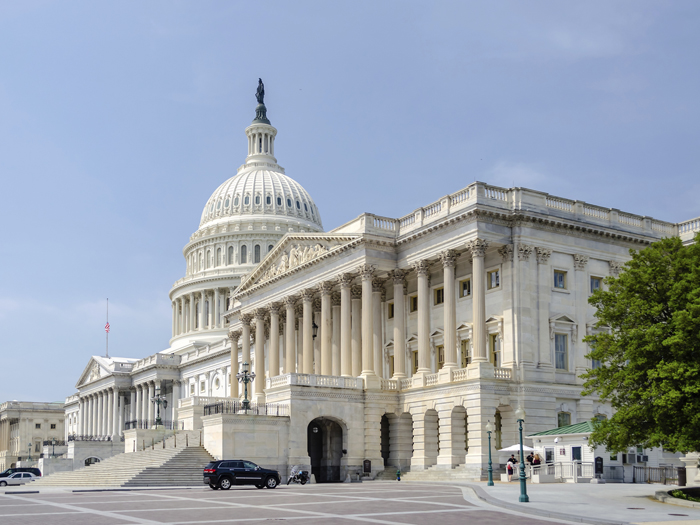A Pandemic Insurance Backstop Needs to Happen. We’re Looking at You, Congress

As COVID-19 wreaks havoc on the U.S. economy, American businesses are closing their doors and laying off workers in record numbers. Many have now discovered they’re left with significant losses as most policies do not cover losses from mandated government closures due to a pandemic.
The federal government is trying to prevent an economic collapse with stimulus funds, bailouts, and small business loans, but there are growing calls from legislators for insurers to cover business interruption claims.
As there’s a strong possibility that insurers could be tied up in litigation for years, some experts say the best way to reduce the downside and save the industry could be to face claims head-on, whether or not their policies specified such coverage in the first place.
By expanding a federal terrorism backstop to include pandemic and then issuing retroactive policies, insurers may be able to pay claims while reducing their own legal exposure.
Unprecedented Business Losses
As COVID-19 expands across the globe, the economic toll is mounting to a level never seen in history.
In late-March, the St. Louis Fed projected the unemployment rate could rise as high as 32%. Michael Hicks, Director of the Center or Business and Economic Research in the Miller College of Business at Ball State University said in late March the pandemic could cost the US $7 trillion in economic losses.
Many sectors, including restaurants, retail and hospitality, have already been brought to a standstill as more than 90% were placed under “stay at home” orders. Even when the virus subsides and restrictions loosen, economists say a full recovery could take years.
With losses so widespread, legislators are already calling for insurers to retroactively cover COVID-10 related business interruption losses.
As of early-April, several states, including New York, New Jersey, Massachusetts, and Ohio, had introduced bills that would force insurers to retroactively cover business interruption claims due to COVID-19.
The New York bill would apply to policies in force by March 7 and be issued to businesses with fewer than 100 full-time employees. It would require insurers to identify the policyholders for any loss of business during a declared state emergency due to the COVID-19 pandemic.
“Something has to be done. I don’t know if it’s on the carriers or the government, but many businesses are being slaughtered,” said Jason Upton, president of the Upton Group in Guntersville, Ala.
Upton Group specializes in insurance for the restaurant industry and has seen many of its clients devastated by the inability to operate. While much of the country focuses on emergency response and mitigating further spread of the virus, there has yet to be much focus on business continuity and economic restoration.
Insurance professionals know it’s a major issue as viruses and pandemics are typically excluded from standard commercial insurance policies. Yet a bigger problem could be forcing insurers to cover losses which they didn’t underwrite or collect premiums for.
“I fear that if you open up these carriers to paying for something they didn’t calculate, the end consequences of that could be worse than the problem because it could last for decades,” Upton said.
A Path Forward
As the pressure mounts for insurers to cover losses, it may be a more viable move to face the claims rather than just deny them, according to Zach Finn, director of the Davey Risk Management and Insurance Program at Butler University.
Finn points to previous disasters, such as Hurricane Katrina in 2005 when insurers spent billions defending themselves against plaintiffs claiming that uninsured flood losses should have been covered under their homeowners’ insurance.
With millions of businesses facing uninsured losses and politicians eager to please constituents, Finn believes the legal pressures could cripple the insurance industry.
“Do they really want to fight that battle? Every single person, from the insured to the carrier and broker, is going to have litigation until the end of time on uncovered coronavirus losses,” he said.
One option could be to cover COVID-19 losses retroactively under a plan that would likely be less expensive than litigation.
Finn believes this can be accomplished by amending the Terrorism Risk and Insurance Act (TRIA) to add pandemic coverage and accept claims just as if COVID-19 were a terrorist attack.
TRIA was signed into law in 2002 after 9/11 and designed to serve as a federal “backstop” for insurance claims related to acts of terrorism.
“I’m not trying to advocate the insurance industry take the losses from the pandemic…But they’re the cleanest path to the federal government. Instead of viewing it as a loss, it’s like protection against lawsuits that would come by denying claims in the future,” Finn said.
Expanding TRIA to Cover Pandemic
Under the Proposed Terrorist, Pandemic Risk Insurance Act (TP-RIA), coverage would be back-dated to include business interruption losses for the COVID-19 Pandemic of 2020.
As the government would cover 80% of losses, this would offer a cap for insurers that would likely be far more digestible than covering losses for which they had no underwriting or collected premiums, Upton says.
“It would be preferable over forcing carriers to pay for something that is not covered. TRIA hasn’t had a claim since it was formed in 2002,” Upton said.
Yet even if TRIA were to be triggered, insurers would need to quickly expedite claims as few businesses would be able to survive months of the pandemic without income.
As the sheer volume of claims would be too time-consuming to field with an army of adjustors, Finn believes the best way to do it would be to determine an agreed percentage of the business interruption losses based on the revenue on their tax return.
“There has to be some sort of method to determine what someone’s loss is but at the same time, the process can’t drag out for months or it will be too late,” Upton said.
“Many businesses can’t wait and won’t survive.” &












